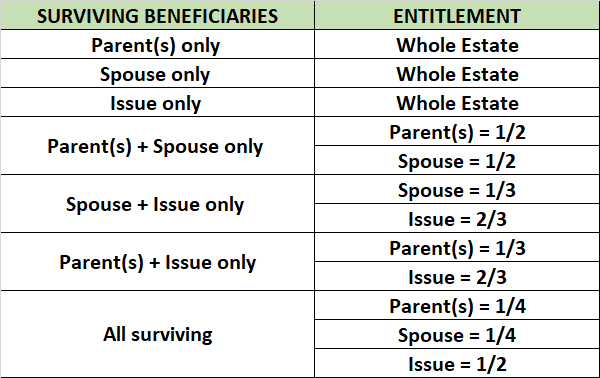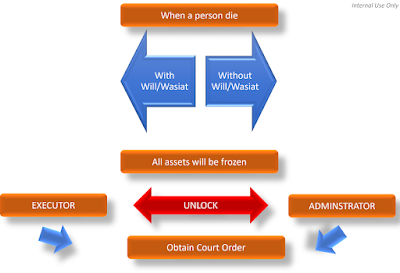Financial Planning involves a few component that are very crucial.
The components are:
- Cash Flow Management
- Investment Planning
- Insurance Protection
- Tax Planning
- Retirement Planning
- Estate Planning
In this article, we will touch on Estate Planning.
Most people presume that their assets will automatically go to their loved ones when they passed on.
However, there is a legal process to follow before any assets can be transferred.
What is Estate Planning
Estate planning is the process of managing and administering the assets of an individual through the accumulation, conservation, and distribution phases of life in an effective and efficient manner according to the wishes of the owner. This is very important to ensure the continuity of your assets to your family members and intended beneficiaries.
Situation Upon Demise
Upon a person’s demise
Testate:
• Died with a valid Will/Wasiat
• Estate Distributed according to Will/Wasiat
• Grant of Probate
Intestate:
• Died without a Will/Wasiat
• Estate Distributed according to Distribution Act
• Estate Distributed according to Faraid Law (Muslims)
• Letters of Administration
Partial Intestate:
• Dies with a valid Will/Wasiat but incomplete asset
disposition
• Will & Distribution Act
• Letters of Administration with Will Annexed
LETTERS OF ADMINSTRATION
JURISDICTION TO ISSUE: LETTERS OF ADMINISTRATION IN MALAYSIA
WEST MALAYSIA:
Non-Muslims – Distribution Act 1958 (Distribution Amended Act 1997)
Muslims – Faraid Law
SARAWAK:
Non-Muslims – Distribution Act 1958 (Distribution Amended Act 1997)
Muslims – Faraid Law
SABAH:
Non-Muslims – Intestate Succession Ordinance 1960
Muslims – Faraid Law
LIMITATION:
a) Distributions is strictly regulated
b) Does not recognize illegitimate /step/adopted children (Muslim Only)
DISTRIBUTION OF ASSETS (NON-MUSLIM AND MUSLIMS)
Who is a Beneficiary?
A beneficiary is an individual or a corporation who will benefit after your demise
by inheriting the predetermined amount or assets specified by you.
However, do you know who are your beneficiaries?
NON-MUSLIM DISTRIBUTION
MAIN BENEFICIARIES
Parent(s) - Natural parents or the lawful parents of a child under the Adoption Act 1952.
Spouse - Legally married OR customary marriage before 1 March 1982.
Issue - Legitimate children and descendants of the deceased children.
DISTRIBUTION ACT 1958 (AMENDED 1997)
(PENINSULAR MALAYSIA & SARAWAK ONLY)
INTESTATE SUCCESSION ORDINANCE 1960
(SABAH ONLY)
The following person(s) are entitled to the estate in accordance to priority when he or she dies without leaving a surviving spouse, child or parent:-
- Brothers & Sisters
- Grandparents
- Uncle & Aunts
- Great Grandparents
- Great Uncle & Aunts
- Government
AT THE END OF THE DAY THE HOUSE IS SPLIT INTO 11 NAMES!!!!
Estate Planning Tools
- Lifetime Transfer
- Nomination
- Will / Wasiat
- Private Trust
Lifetime Transfer
NOMINATION (INSURANCE/EPF)
A Will/Wasiat is a declaration in prescribed form (written) of the intention of the person making it of the matters which he or she wishes to take effect upon his or her death, until which time it is revocable.
“A Will/Wasiat ensures efficient distribution of assets and one may include specific instructions to specific persons and cater for special circumstances.With a will entire estate can be distributed to your loved ones”
A WILL IS IMPORTANT
A WASIAT IS IMPORTANT
- Faster & Smoother Distribution
- Choice of Executor(s) & Trustee(s)
- Choice of Beneficiary(ies)
- Benefit non-immediate family member
- Own manner of distribution
- Choice of Guardian
- Prevent hassles and disputes
- Prevent splitting of assets
Private Trust
Private trust is a trust created during an individual's lifetime where the trust creator (“settlor”) entrust and transfer the legal ownership of the Settlor’s assets to a trustee via a trust deed.
The trustee is given the responsibility to administer the assets and act according to the terms of the trust deed for the benefit of the beneficiaries.
One of the key advantage of private trust is to provide immediate liquidity to the beneficiaries while pending the long and complex legal process of probate.
PARTIES INVOLVED IN A TRUST
- SETTLOR
- PROTECTOR(S)
- BENEFICIARY(IES)
- TRUSTEE
OBEJCTIVES TO MEET WHEN SETTING UP A TRUST
Intention - Settlor must be clear on the intentions and objective of creating the trust
Subject Matter - Settlor must also clearly identify the asset(s) and to be legally transferred into the trust
Object - Settlor must be clear who are the beneficiaries nominated to be entitled from the trust
Private Trust
TYPES OF TRUST
Discretionary Trust
• Beneficiaries do not have a fixed entitlement or interest.
• Trustee has the discretion to determine beneficiaries’ entitlement.
• Trustee can only distribute to beneficiaries within a nominated class as set out in the terms of the trust deed.
Non-discretionary Trust
• Beneficiaries have a fixed entitlement or interest.
• Trustee do not have the discretion to determine beneficiaries’ entitlement.
• Trustee is directed to invest in named investments and to diversify the investments among specific types of investments.
• The trustee has no discretion or personal decision making power in the matter.
PRIVATE TRUST VS TESTAMENTARY TRUST
Trust for Children
Wealth Preservation / Protection Trust for Children






















![[Covid-19 Latest Updates] KLSE Index Rebounded](https://blogger.googleusercontent.com/img/b/R29vZ2xl/AVvXsEi9SW_IBop_jhHwXL7QJBOoxDzMj9flvvsz7_OIbjPTeC6NFke0kJxhUDuxc61hiieDJJ6Gx2P0AFJwqccM6xpszFoM0wPlXnyiCJrDHhSE1vfn3aI_Agfin-p9qOwuCEyasi-wprjSqYDw/w100/Slide2.PNG)


![[LATEST] KLSE Stock Best Dividend (UPDATED 20 MARCH 2020)](https://blogger.googleusercontent.com/img/b/R29vZ2xl/AVvXsEhIp9Zu5l7EnNju0NvAY1yq7sCgFxhkqLTWGm5c_VY6xR3lKTvKcrqp2Avp7w1lFaKtiviEMnxAftmDktmnbAck2yGX_-dI6z0vzp2-cpqKBS7ze48FxutAetF-2827pMDZtbU4RfJqfdBv/w100/TOP+27+KLSE+STOCKS.001.jpeg)
![[LATEST] KLSE Best Dividend Stock (UPDATED 24 JANUARY 2021)](https://blogger.googleusercontent.com/img/b/R29vZ2xl/AVvXsEildh9exPtPC6TbJ5rkyBt0g8EXhogZN2XkfGpVFt4u-j0Hy_zc70JGjbYeVymxcWPZGqsneAugrZMsfd_WWwMsyyzdgY3eSdwy_AbBKGjSx0wduKVEsiXQM3Mj43XvO8l6YpmFvk9KnOfD/w100/Malaysia+Investment_KLSE+Best+Dividend+Yield+Stock_2021.png)

0 Comments
What do you think of the post?
Kindly share your input, we want to hear from you.